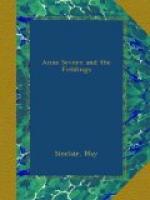Anne was in the house, in the great Jacobean room on the first floor. Barker had judged it too large and too dilapidated to live in, and it had been left empty in his time. Eliot had had it restored and Jerrold had furnished it. Black oak bookcases from the Manor stretched along the walls, for Jerrold had given Eliot half of their father’s books. This room would be too dilapidated to live in, and it had been left empty in his time. Eliot had had it restored and Jerrold had furnished it. Black oak bookcases from the Manor stretched along the walls, for Jerrold had given Eliot half of their father’s books. This room would be Eliot’s library when he came down. It was now Anne’s sitting-room.
The leaded windows were thrown open to the grey evening and a drizzling rain; but a fire blazed on the great hearth under the arch of the carved stone chimney-piece. Anne’s couch was drawn up before it. She lay stretched out on it, tired with her week’s work.
She was all alone in the house. The gardener and his wife went out together every Sunday to spend the evening with their families at Medlicote or Wyck. She was not sorry when they were gone; the stillness of the house rested her. But she missed Colin. Last Sunday he had been there, sitting beside her in his chair by the hearth, reading. Today he was with Jerrold at the Manor. The soft drizzle turned to a quick patter of rain; a curtain of rain fell, covering the grey fields between the farm and the Manor, cutting her off.
She was listening to the rain when she heard the click of the gate and feet on the garden path. They stopped on the flagstones under her window. Jerrold’s voice called up to her.
“Anne—Anne, are you there? Can I come up?”
“Rather.”
He came rushing up the stairs. He was in the room now.
“How nice of you to come on this beastly evening.”
“That’s why I came. I thought it would be so rotten for you all alone down here.”
“What have you done with Colin?”
“Left him up there. He was making no end of a row on the piano.”
“Oh Jerrold, if he’s playing again he’ll be all right.”
“He didn’t sound as if there was much the matter with him.”
“You never can tell. He can’t stand those tractors.”
“We must keep him away from the beastly things. I suppose we’ve got to have ’em?”
“I’m afraid so. They save no end of labour, and labour’s short and dear.”
“Is that why you’ve been working yourself to death?”
“I haven’t. Why, do I look dead?”
“No. Eliot told me. He saw you at it.”
“I only take a hand at hay time and harvest. All the rest of the year it’s just riding about and seeing that other people work. And Colin does half of that now.”
“All the same, I think it’s about time you stopped.”
“But if I stop the whole thing’ll stop. The men must have somebody over them.”




